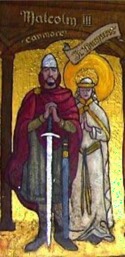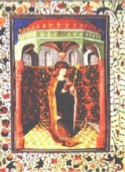Kevin Patrick Mostyn Family - Person Sheet
Kevin Patrick Mostyn Family - Person Sheet

NameMalcolm Canmore III King Of Scotland, 27G Grandfather
FatherDuncan I 'the Gracious' King Of Scots (~1001-1040)
MotherÆfflaed Of Northumbria
Spouses
1Ingiborg 'Earls' Mother' FINNSDOTTIR, 29G Grandmother
FatherFinn ARNISSON Jarl In Halland (-1065)
MotherThorbjorg HALFDANSDOTTIR

2Saint Margaret Queen Of Scotland, 27G Grandmother
FatherEdward 'the Exile' ATHELING (~1016-1057)
MotherAgatha VON BRAUNSCHWEIG (~1025->1066)
Web Notes notes for Malcolm Canmore III King Of Scotland
Killed while invading England, 1093.
From the book, "Scotland: a Concise History" revised edition, by Fitzroy Maclean, 1993, page 23:
In 1057 he defeated and killed Macbeth, who had killed his father, thus regaining for his family his father's throne to which he had never abandoned his claim. Malcolm III, known to his contemporaries as Ceann Mor or Bighead, had been brought up in England from the age of 9. In 1069, twelve years after his return to Scotland, he married, as his second wife, the English Princess Margaret, who had taken refuge in Scotland with her brother Edgar the Atheling after the Norman Conquest of England in 1066.
page 24:
He and his successors laid the foundations of feudalism in Scotland. Malcolm, being himself English-educated, was inclined to share his wife's English views and during his reign shifted the cultural centre of his kingdom southwards into anglo-Saxon Lothian, thereby seriously offending the Celtic north.
page 25:
But Malcolm's interest in his southern neighbour was strategic as well as cultural. The northern counties of England seemed to him to offer possibilities for expansion and in his brother-in-law Edgar the Atheling he had at his Court a ready-made claimant to the English throne. He accordingly launched a series of border raids into Northumberland and Cumberland. These provoked retaliatory expeditions on the part of the Normans and in 1071 William the Conqueror finally invaded Scotland and forced Malcolm to pay homage to him at Abernethy. In the intervals of the fighting amicable relations were maintained between the two countries, for Malcolm remained a popular figure at the English Court. In 1093, however, in the course of an attack on Alnwick in Northumberland (intended, it was said, to forestall a Norman invasion), he was killed in an ambush by one of his Norman friends named Morel.
Weis' "Ancestral Roots. . ." (158:23), (169:25), (170:21), (171:21).
The following is taken from an Internet posting of Michael R. Davidson of Edinburgh. Scotland, on 23 Oct 1995:
Malcolm Canmore (literally Malcolm 'big head', perhaps Malcolm 'great leader' captures the essence) (Mael Coluim Ceann Moir mac Donnchad) Before talking about Malcolm, I must again write a word about Macbeth. Macbeth, in actuality, had a legitimate claim to the kingship, and appears to have been a competent and well liked king as well. Contemporary sources noted that Scotland was prosperous during his reign, and a contemporary chronicler noted that Macbeth 'scattered money like seed among the poor' during his pilgrimage to Rome in 1050.
To turn to Malcolm, his first attempt to gain the kingship came in 1054, when he invaded Scotland with an English army and fought a battle on 27 July. It was not a decisive battle for either side; higher Scottish losses were reported, but Earl Siward's son was killed, and Macbeth remained king. Macbeth does, however, appear to have been seriously weakened by the battle. In 1057, Malcolm made his second attempt on the throne. He was defeated by Macbeth on 15 August 1057, but Macbeth was mortally wounded, and died the next day. Macbeth was succeeded by another member of the Cenel Loairn, Lulach son of Gillacomgain. Lulach proved to be less stern opposition, and Malcolm defeated and killed him on 17 March 1058, and took the kingship.
Malcolm soon turned on his English allies, and invaded Northumbria in 1061. Another invasion in 1070 was not well received by William the Conqueror, who invaded Scotland in 1072, and forced Malcolm to give up his son Duncan as a hostage. Malcolm successfully dealt with internal opposition in 1077, when he defeated an attempt by Lulach's son Maelsnetchai to seize the kingship. A raid on England in 1079 was defeated, but a successful raid in 1091 set off the chain of events which lead to Malcolm's death. William Rufus refused to respond to overtures from Malcolm in 1093, and Malcolm invaded England for the last time. During the siege of Alnwick Castle in Northumbria, Malcolm was ambushed and killed along with his son Edward on 13 November 1093. He was succeeded by his brother Donald Ban.
From the book, "Scotland: a Concise History" revised edition, by Fitzroy Maclean, 1993, page 23:
In 1057 he defeated and killed Macbeth, who had killed his father, thus regaining for his family his father's throne to which he had never abandoned his claim. Malcolm III, known to his contemporaries as Ceann Mor or Bighead, had been brought up in England from the age of 9. In 1069, twelve years after his return to Scotland, he married, as his second wife, the English Princess Margaret, who had taken refuge in Scotland with her brother Edgar the Atheling after the Norman Conquest of England in 1066.
page 24:
He and his successors laid the foundations of feudalism in Scotland. Malcolm, being himself English-educated, was inclined to share his wife's English views and during his reign shifted the cultural centre of his kingdom southwards into anglo-Saxon Lothian, thereby seriously offending the Celtic north.
page 25:
But Malcolm's interest in his southern neighbour was strategic as well as cultural. The northern counties of England seemed to him to offer possibilities for expansion and in his brother-in-law Edgar the Atheling he had at his Court a ready-made claimant to the English throne. He accordingly launched a series of border raids into Northumberland and Cumberland. These provoked retaliatory expeditions on the part of the Normans and in 1071 William the Conqueror finally invaded Scotland and forced Malcolm to pay homage to him at Abernethy. In the intervals of the fighting amicable relations were maintained between the two countries, for Malcolm remained a popular figure at the English Court. In 1093, however, in the course of an attack on Alnwick in Northumberland (intended, it was said, to forestall a Norman invasion), he was killed in an ambush by one of his Norman friends named Morel.
Weis' "Ancestral Roots. . ." (158:23), (169:25), (170:21), (171:21).
The following is taken from an Internet posting of Michael R. Davidson of Edinburgh. Scotland, on 23 Oct 1995:
Malcolm Canmore (literally Malcolm 'big head', perhaps Malcolm 'great leader' captures the essence) (Mael Coluim Ceann Moir mac Donnchad) Before talking about Malcolm, I must again write a word about Macbeth. Macbeth, in actuality, had a legitimate claim to the kingship, and appears to have been a competent and well liked king as well. Contemporary sources noted that Scotland was prosperous during his reign, and a contemporary chronicler noted that Macbeth 'scattered money like seed among the poor' during his pilgrimage to Rome in 1050.
To turn to Malcolm, his first attempt to gain the kingship came in 1054, when he invaded Scotland with an English army and fought a battle on 27 July. It was not a decisive battle for either side; higher Scottish losses were reported, but Earl Siward's son was killed, and Macbeth remained king. Macbeth does, however, appear to have been seriously weakened by the battle. In 1057, Malcolm made his second attempt on the throne. He was defeated by Macbeth on 15 August 1057, but Macbeth was mortally wounded, and died the next day. Macbeth was succeeded by another member of the Cenel Loairn, Lulach son of Gillacomgain. Lulach proved to be less stern opposition, and Malcolm defeated and killed him on 17 March 1058, and took the kingship.
Malcolm soon turned on his English allies, and invaded Northumbria in 1061. Another invasion in 1070 was not well received by William the Conqueror, who invaded Scotland in 1072, and forced Malcolm to give up his son Duncan as a hostage. Malcolm successfully dealt with internal opposition in 1077, when he defeated an attempt by Lulach's son Maelsnetchai to seize the kingship. A raid on England in 1079 was defeated, but a successful raid in 1091 set off the chain of events which lead to Malcolm's death. William Rufus refused to respond to overtures from Malcolm in 1093, and Malcolm invaded England for the last time. During the siege of Alnwick Castle in Northumbria, Malcolm was ambushed and killed along with his son Edward on 13 November 1093. He was succeeded by his brother Donald Ban.
